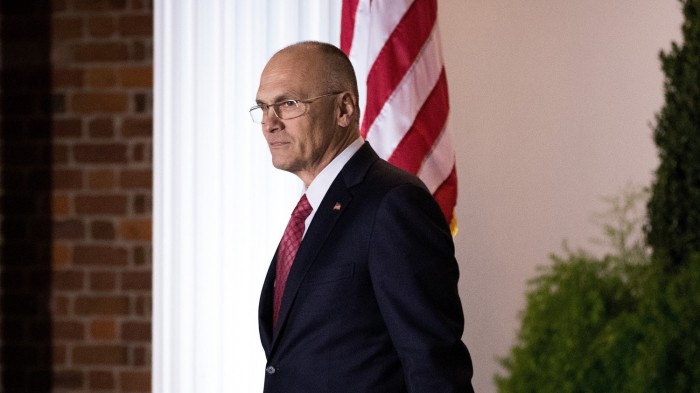Unlock the White House Watch newsletter for free
Your guide to what Trump’s second term means for Washington, business and the world
The EU must either prove that its digital rules do not punish US tech companies and infringe on freedom of speech or change them, Donald Trump’s ambassador to the bloc has said, to ensure “a good relationship going forward”.
Andrew Puzder told the Financial Times that the US would make formal submissions to the European Commission under an ongoing review of its digital legislation, “to have some discussions about where the real points of disagreement are and how they can be addressed”.
“The Europeans believe that [the rules] are less restrictive and less targeted than the US believes, and I think we’re going to need to sit down and go through these acts with some care,” Puzder said, to ensure they did not “punish” US interests.
The US president has threatened to retaliate against countries that “discriminate” against American companies. Washington has long railed against the EU’s digital rule book, including the Digital Markets Act (DMA), which aims to curb the power of Big Tech companies, and the Digital Services Act (DSA), which polices content online.
The tension over the EU’s implementation of its tech rules threatens to undermine bilateral ties that have been bolstered by a recent trade deal, a promise by European capitals to spend more on defence and Trump’s decision to restart support to Ukraine.
Puzder, who took up his post this month, said no US president, regardless of party, “can sit back and allow these kinds of infringements on Americans’ fundamental rights or, in fact, on American companies”, adding: “So we’re going to have to either determine that that’s not what’s happening, or we’ll have to make some changes so that it isn’t what’s happening.”
The commission has opened a public consultation on how best to simplify some of its digital legislation. There is some uncertainty about how broad the scope will be, with civil society and some members of the European parliament worried the exercise could weaken some of the rules. The consultation closes on October 14.
Puzder’s comments come amid a renewed lobbying push from Big Tech against the DMA, which entered into force in 2022 and aims to level the playing field for smaller rivals. Companies that do not comply face fines of up to 10 per cent of global revenue.
Apple last week demanded Brussels scrap the legislation altogether. Meta chief executive Mark Zuckerberg has personally lobbied Trump against it. Google has said it causes “significant and unintended harm to European users”.
The commission has said it is not considering any repeal of the DMA. It also stresses that the legislation does not take into account where companies are based, but only whether they comply.
The EU’s digital rules “take up a fair amount of [my] brain space”, Puzder said. “It seems from my meetings here in the EU, there is a very distinct disagreement as to what the [DMA and DSA] do, what their effect is.”
“Europe has every right to legislate as it chooses. But I think it would be good if we could have an understanding of each side’s points on this before we get too far along.
“While the legislation may look facially neutral, I think that if the intent is to inflict economic pain on competitors outside of Europe to help European companies, that’s something that the United States would object to vehemently,” he added. “Obviously, if we’re going to have a good relationship going forward, you can’t have legislation that punishes companies from . . . your ally.”
At the same time, Puzder praised the commission and its president Ursula von der Leyen for agreeing a broad trade deal with Trump in July that averted a transatlantic trade war. The agreement was proof of how both could benefit if they worked together to find solution, he said.
“In my opinion, the EU got a good deal,” said Puzder. “There’s a lot of politics about the deal. I think it could be more aggressively defended in Europe.”
Puzder pointed to the US decision to implement a 15 per cent tariff on cars, before the deal was fully agreed, as a sign the US “wants to work” with the EU.
“It was an effort to show that, you know, we are going to act in good faith on this, and we expect you [the EU] to do the same,” he said.
